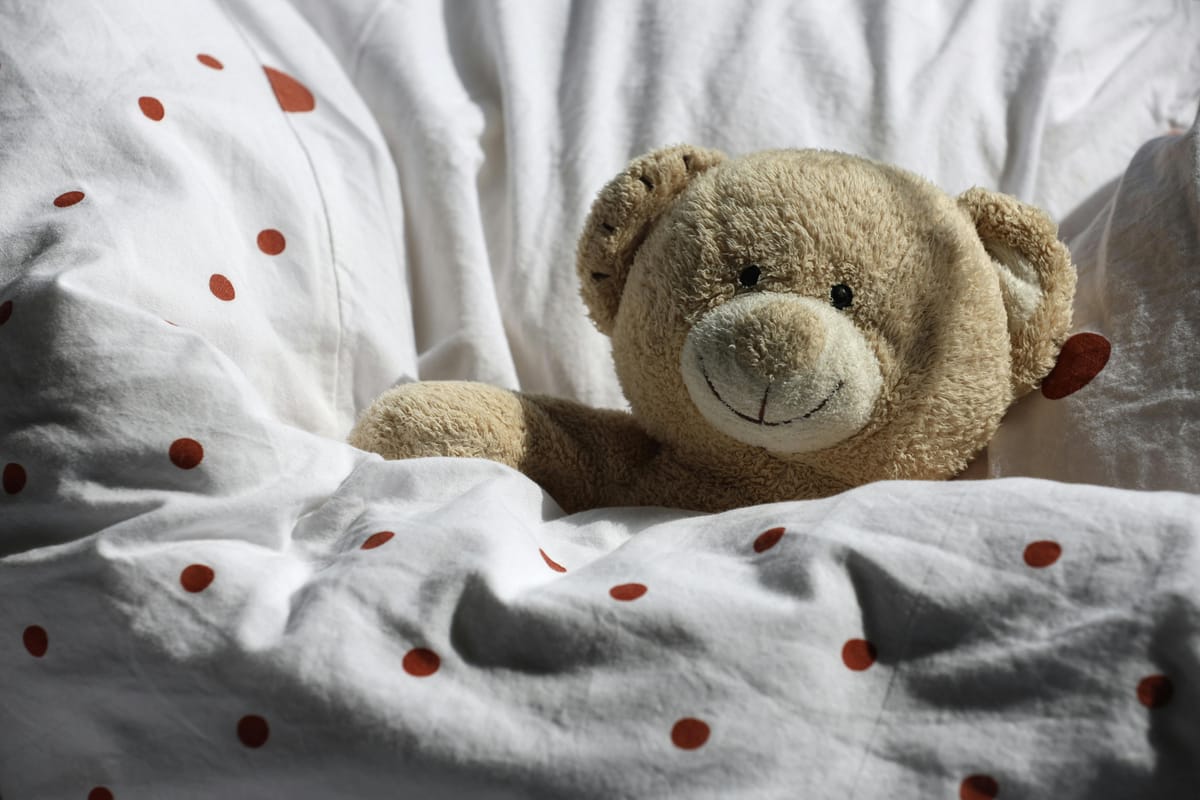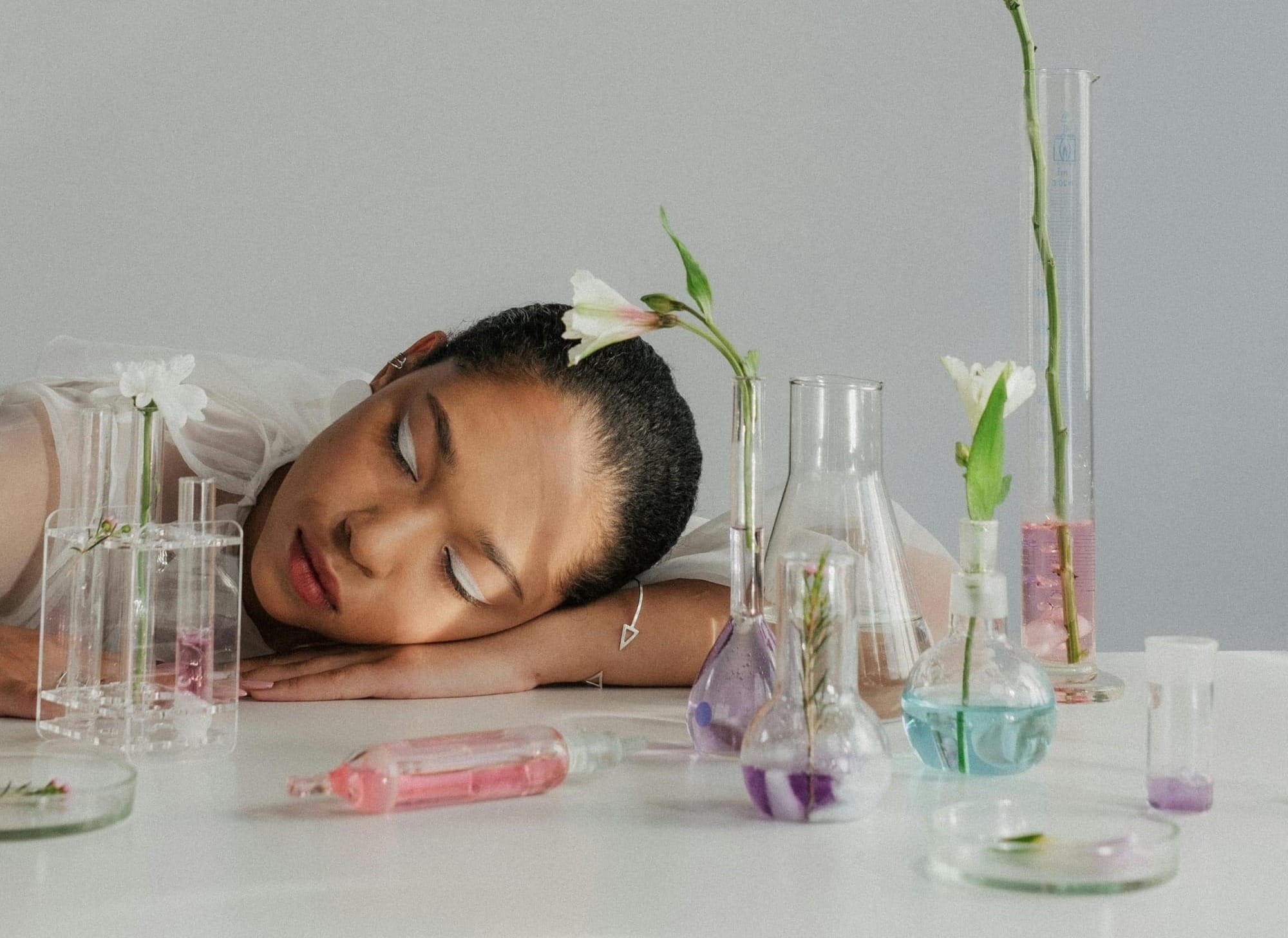Sleep Hygiene 101: The Science of Sleep and Habits for Better Mental Health

Wonder why you feel so much better after a good night’s sleep?
Sleep is as important to your health as diet. Getting quality sleep isn’t just about feeling rested; it’s essential for your mental health, brain function, and overall wellness. On the flip side, not getting enough sleep on a regular basis raises the risk of a host of problems, from mood issues to serious conditions like heart disease and dementia (NIH, n.d.).
Unfortunately, many of us struggle to get the sleep we need. In fact, more than one-third of adults in the U.S. don’t get enough sleep; about 14% have trouble falling asleep, and 18% struggle to stay asleep throughout the night (Harvard Health Publishing, n.d.).
The good news is that by understanding the science of sleep and practicing healthy sleep hygiene (simple habits for better sleep), you can improve your rest and boost your mental well-being. This friendly guide explores why sleep matters, how it works, and offers practical tips to help you sleep better, starting tonight.
Looking to improve your sleep and mental health? Try Aitherapy
Why Sleep Matters for Body and Mind
Sleep is often called “nature’s nurse” for good reason. While you sleep, your body and brain are hard at work repairing and recharging. For example, during deep sleep, your body releases hormones that repair tissues and strengthen your immune system.
Your brain uses sleep as a time to consolidate memories and even clear out toxins that build up during the day , almost like a mental cleanup crew flushing out waste. Skimping on sleep disrupts these vital processes. Research indicates that insufficient quality sleep can impair brain function, mood, and overall health (NIH, n.d.).
You may notice this as foggy thinking, poor concentration, irritability, or increased stress after a poor night’s sleep.Over time, chronic sleep deprivation is linked to higher risks of anxiety and depression, as well as physical issues like weakened immunity, high blood pressure, diabetes, and stroke.On the other hand, sufficient sleep is a powerful mood booster and stress reducer. When you’re well-rested, you’re likely to feel more alert, emotionally balanced, and resilient. In fact, getting enough sleep can literally improve your outlook: studies find that adequate sleep helps regulate the brain’s emotional responses, leading to more positive moods and better coping with daily stress (Columbia Psychiatry, n.d.).
It’s no wonder the Centers for Disease Control and Prevention (CDC) calls good sleep “essential for our health and emotional well-being” (CDC, n.d.).For most adults, experts recommend aiming for at least 7 hours of sleep per night on a consistent basis (Columbia Psychiatry, n.d.).
Keeping a regular sleep schedule and ensuring your sleep is uninterrupted and restful are key ingredients of healthy rest (NIH, n.d.).

The Science of Sleep: Stages, Cycles, and Circadian Rhythms
What actually happens when you fall asleep?
Sleep isn’t one long, uniform state ;it consists of different stages that cycle throughout the night. Broadly, sleep is divided into two main categories: REM (rapid eye movement) sleep and non-REM (non-rapid eye movement) sleep. Non-REM sleep has three stages (often called N1, N2, N3):
- Stage 1 (N1): The lightest sleep as you drift off. You can be easily awakened from this stage.
- Stage 2 (N2): Slightly deeper sleep as your body starts to relax more – heart rate and breathing slow, and body temperature drops (Sleep Foundation, n.d.).
- Stage 3 (N3): Deep sleep (also known as slow-wave sleep). This is the most restorative stage, during which the body undergoes repair and growth (Sleep Foundation, n.d.).
If someone shakes you awake from deep sleep, you’ll likely feel groggy and disoriented, because your brain was in “recovery mode.”
After cycling through N1–N3, you enter REM sleep (Stage 4). In REM, your brain becomes highly active .This is when most dreaming happens, and your eyes move rapidly under your lids. Interestingly, your body goes into a temporary paralysis during REM (so you don’t act out your dreams).
REM sleep is an essential stage for cognitive function and mental health, facilitating memory consolidation and emotional processing (Harvard Health Publishing, n.d.).If you’ve ever noticed that a night of poor sleep leaves you mentally scattered or moody, it’s partly because you missed out on sufficient REM and deep sleep.
Humans normally cycle through these stages every ~90 minutes, completing 4–6 sleep cycles in a full night (Sleep Foundation, n.d.). Early in the night, you tend to get more deep N3 sleep; later in the night, REM periods grow longer (Merck Manuals, n.d.).Ever wonder why the most vivid dreams often happen in the early morning hours? That’s when REM is peaking.
Circadian rhythms also play a significant role.This is your internal 24-hour clock that responds to light and darkness. Your circadian rhythm makes you feel awake during the day and sleepy at night.
Disrupting this natural cycle (for example, by working night shifts or staring at bright screens at 2 a.m.) can confuse your body clock and compromise your sleep quality. Keeping a consistent schedule and getting morning daylight can help keep your circadian rhythm on track, so you feel sleepy at bedtime and alert in the morning.

Sleep and Mental Health: A Two-Way Street
It’s no secret that a lousy night’s sleep can make you feel on edge. There’s a strong scientific link between sleep and mental health; each affects the other. Poor or insufficient sleep can intensify negative emotions and reduce your ability to cope with stressors (Columbia Psychiatry, n.d.)
You might notice you’re more irritable, anxious, or down after sleeping poorly. This isn’t just in your head: one study found that people who averaged under 6 hours of sleep per night were about 2.5 times more likely to frequently experience mental distress compared to those who got a healthy amount of sleep (CDC, n.d.).
Over time, chronic sleep deprivation increases the risk of developing mental health disorders. Not getting enough sleep (or consistently poor-quality sleep) has been linked to higher chances of depression and anxiety (Columbia Psychiatry, n.d.).In fact, insomnia is often a symptom of mental health conditions and a contributing factor that can make those conditions worse (Columbia Psychiatry, n.d.). It’s a vicious cycle.The relationship also works in reverse: mental health issues can disrupt sleep. Stress or racing thoughts can keep you up at night, and conditions like anxiety or PTSD often come with insomnia. It can become a chicken-and-egg situation.
Are you not sleeping because you’re anxious, or anxious because you’re not sleeping?
More often than not, it’s both.
That’s why improving your sleep can have noticeable benefits for your mental wellness. When you start sleeping better, you may find your mood lifts, stress becomes easier to manage, and you’re more emotionally resilient. In fact, treating sleep problems is now recognized as an important step in treating depression and anxiety.The encouraging news is that addressing sleep issues can alleviate psychiatric symptoms and improve overall mental health outcomes (Columbia Psychiatry, n.d.).
So, if you’re struggling with mood or stress, one of the most empowering things you can do is prioritize better sleep.
Get started with AiTherapy and access cognitive behavioral therapy tools to help you break the cycle of poor sleep and stress.
(Of course, if you have severe or persistent sleep problems, it’s wise to talk to a healthcare provider. There are effective treatments for sleep disorders; for example, cognitive behavioral therapy can help people with insomnia retrain their sleep habits (NIH, n.d.), so you don’t have to suffer night after night.)
Practicing Good Sleep Hygiene: Healthy Habits for Better Sleep
How can you wake up feeling refreshed and ready for the day?
Often, it comes down to your sleep hygiene ,the daily habits and environment you set up each night.Think of sleep hygiene as a toolkit for better rest. Just like brushing your teeth keeps your smile healthy, good sleep habits protect your sleep.
By incorporating these routines into your daily life, you’ll find it easier to fall asleep, stay asleep, and achieve the deep rest your body and mind need.
Here are some science-backed sleep hygiene tips you can try tonight:
- Stick to a consistent sleep schedule: Our bodies thrive on routine. Try to go to bed and wake up at around the same time every day, yes, even on weekends. A regular schedule keeps your circadian rhythm in sync. Sleeping in late or frequently varying your schedule can make you feel jet-lagged. Aim for 7–9 hours of sleep nightly (most adults need at least 7 hours) (Columbia Psychiatry, n.d.).
If you need to catch up on sleep, a brief 20–30 minute nap earlier in the day can help. However, avoid long or late naps, as they can disrupt nighttime sleep (Harvard Health Publishing, n.d.).

- Create a sleep-friendly bedroom environment: Think of your bedroom as a sleep sanctuary; it should be comfortable, dark, cool, and quiet. Reduce noise with earplugs, white noise, or soft music (Harvard Health Publishing, n.d.). Block out light with blackout curtains or a sleep mask (even small light from electronics can hinder melatonin, the sleep hormone).
Keep the room cool; experts suggest a temperature around 65–68°F (18–20°C) is ideal for most people (Harvard Health Publishing, n.d.). Ensure your mattress and pillows are both supportive and comfortable; if they’re old or causing aches, it may be time to replace them (Harvard Health Publishing, n.d.).
Also, reserve the bed for sleep and relaxation only (and intimacy, if applicable); try not to work, study, or watch intense TV in bed, so your brain associates the bedroom with calm, restful sleep.
- Limit screens and bright lights before bed: The blue light from phones, tablets, and computers can trick your brain into thinking it’s daytime and interfere with your ability to fall asleep.
Try to turn off electronic devices at least 30 minutes (or even an hour) before bedtime (CDC, n.d.). That means putting away phones, shutting down the laptop, and maybe switching to a book instead of the TV. If you do use devices at night, consider turning on night mode or blue-light filters.
Better yet, establish a relaxing wind-down routine in that last hour: dim the lights and do something calming (more on this below). By powering down your screens, you give your mind a chance to produce melatonin and get into sleep mode.
- Watch your food and drink (especially caffeine and alcohol): What you consume in the hours leading up to bed has a significant impact on sleep quality.
- Caffeine is a notorious sleep saboteur ; it can take 6–8 hours to wear off (NIH, n.d.), so that 4 PM coffee might still be revving you up at midnight.
Try to avoid caffeine in the late afternoon and evening. Likewise, heavy meals late at night can cause indigestion or discomfort that keeps you awake, so aim to finish dinner at least 2–3 hours before bedtime. And while a nightcap might make you drowsy at first, alcohol actually disrupts sleep later in the night.
As alcohol is metabolized, it can cause you to wake up more frequently and reduce the amount of REM sleep (the dream stage important for memory and mood) (Harvard Health Publishing, n.d.).
So skip the booze close to bedtime, or keep it very moderate. Also, avoid drinking too much fluid right before bed to minimize middle-of-the-night bathroom trips. If you’re peckish at night, a light snack that’s easy to digest (like a banana or a small bowl of cereal) is unlikely to harm , just keep it small and bland.
- Find a relaxing pre-bed routine: It’s much easier to drift into sound sleep when you spend some time unwinding beforehand. Instead of working or doing chores right up until the moment you try to sleep, give yourself at least 30–60 minutes to relax.
You can use this wind-down period to do calm, screen-free activities that you enjoy. For example, you might read a book (in soft, warm lighting) or listen to gentle music. Some people enjoy a warm bath or shower in the evening – the rise and fall of body temperature can actually cue sleepiness.
Gentle stretches, deep breathing, or a short meditation can also help quiet a racing mind (guided relaxation apps or recordings can be useful here) (Harvard Health Publishing, n.d.).
The key is to avoid anything overly stimulating ,that means shutting down work emails, avoiding intense discussions or scary shows, and definitely putting games or social media on pause. By establishing a consistent bedtime ritual, you’ll train your body to recognize those activities as signals that it’s nearly time to sleep.

- Stay active and manage daytime stress: How you spend your day significantly impacts your nighttime sleep quality. Regular exercise is one of the best things you can do for better sleep – it helps you fall asleep faster and get more deep sleep. Even a daily walk can make a difference. Try to finish vigorous workouts at least a few hours before bed, as exercise revs you up in the short term (NIH, n.d.).
Earlier in the day is best; some people find morning or lunchtime exercise most beneficial for nighttime sleep. Also, try to get some natural daylight in the morning or early afternoon (aim for ~30 minutes of sunlight if you can) (NIH, n.d.). This helps reinforce your circadian rhythm and can also improve your mood and energy during the daytime.
In the evenings, practice simple stress management techniques to help you avoid worrying and stay asleep. This could involve journaling about your day to clear anxious thoughts from your mind, practicing a few yoga poses, or spending a few minutes in meditation or prayer. If you often lie awake with your mind racing, it might help to jot down a to-do list or things you’re grateful for before bed – basically give your brain permission to let go of active thinking.
Over time, lower stress will translate to easier, deeper sleep, which in turn will further reduce your stress, creating a positive cycle.
Adding these sleep hygiene habits to your daily routine can help you sleep better and wake up feeling more refreshed. Improving your sleep takes time and a bit of trial and error, so be patient with yourself. If it takes a while to find what works, that’s normal; every small change matters.
Even adopting one new habit, such as going to bed at the same time or turning off screens after 10 PM, can make a significant difference in how you feel.
Ready for a healthier sleep routine? Start Talking
Empowering Your Wellness Through Sleep
With busy schedules, it’s easy to give up sleep for late-night tasks or scrolling on your phone.
But sleep is not a luxury; it’s something your body truly needs.
Making sleep a priority is one of the best things you can do for your mind and body. When you get enough rest, you may notice your mood improves, your focus gets sharper, and you have more energy. Better sleep can help you feel more balanced and productive each day.
Remember, better sleep doesn’t just happen by luck; it comes from building good habits and creating a restful environment. Our bodies are made for regular, restorative sleep. By following routines, avoiding disruptions, and practicing healthy habits, you can reap the numerous benefits of a good night's sleep.
With some effort, you can enhance your sleep, improve your mood, and experience a better quality of life.
So tonight, why not treat yourself to a soothing wind-down ritual and a restful night's sleep?
Small choices you make each night can add up to big improvements over time. Better sleep can help you feel healthier and happier, so you wake up each morning with more energy.
Wishing you restful nights and bright mornings. 🌙✨
Looking for more ways to support your mental health?
Explore expert-backed guides and practical tips on Aitherapy’s Blog.

REFERENCES
Centers for Disease Control and Prevention. (n.d.). Sleep and sleep disorders. https://www.cdc.gov/sleep/index.html
Columbia University Department of Psychiatry. (n.d.). Sleep and mental health. https://www.columbiapsychiatry.org/
Harvard Health Publishing. (n.d.). Sleep and mental health. https://www.health.harvard.edu/
Merck Manuals. (n.d.). Normal sleep patterns. https://www.merckmanuals.com/home/
National Institutes of Health. (n.d.). Sleep: How much do you need? https://newsinhealth.nih.gov/





